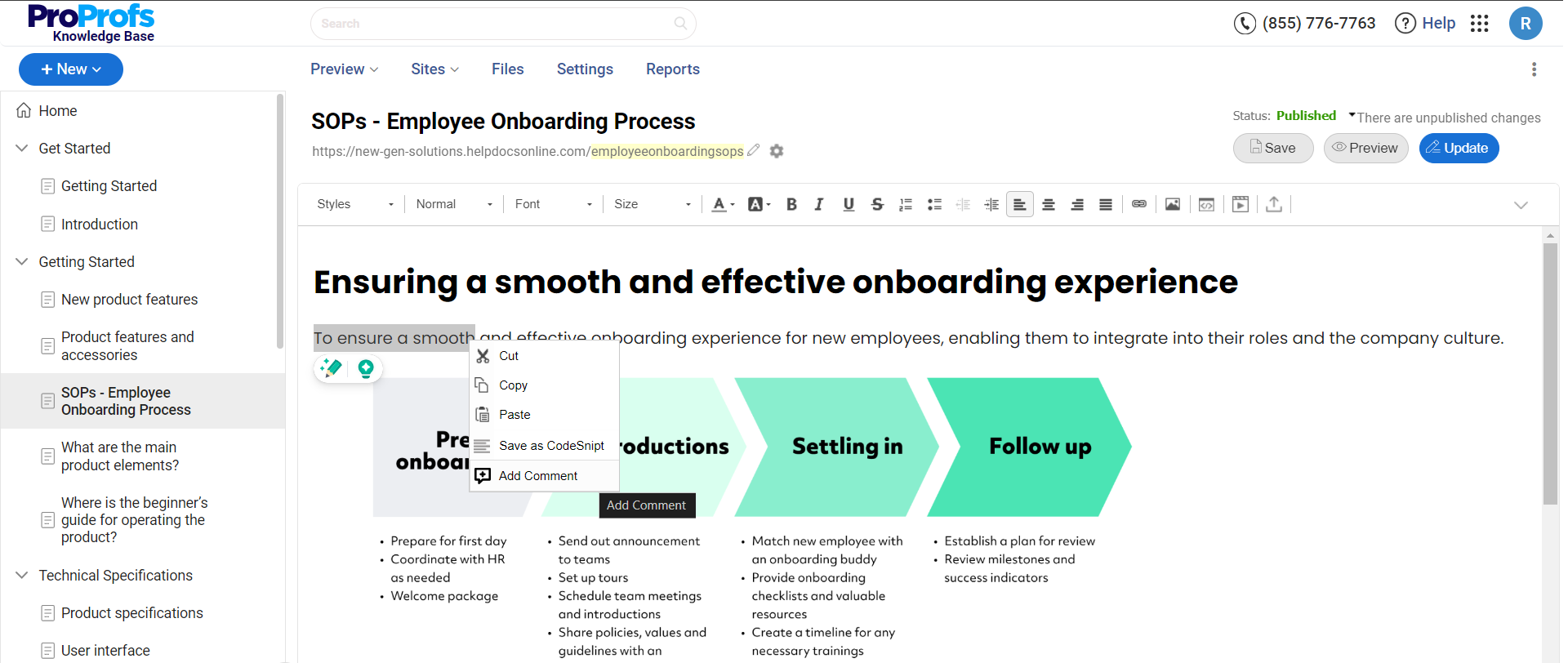Imagine if your database talked back to you and understood the subtleties of human language. An AI knowledge base makes that a reality.
It utilizes artificial intelligence to elevate how organizations manage, store, and retrieve information. According to a study by Deloitte, 81% of contact center executives are investing in AI technologies to improve the agent’s experience and operational efficiency.
In this blog, we’ll explore what makes AI knowledge bases critical assets, discuss their various types, and learn how to build one using AI knowledge base software.
What Is an AI Knowledge Base?
An AI knowledge base is an advanced, sophisticated version of a traditional knowledge base system powered with artificial intelligence to improve information management and retrieval.
Unlike conventional databases that rely on static content storage and keyword-based search algorithms, AI knowledge bases use machine learning, natural language processing (NLP), and other AI technologies to understand the context and semantics of user queries. This enables more accurate, relevant, and personalized responses, enhancing the user experience.
For example, consider a tech company that develops and sells consumer electronics. They implement an AI knowledge base to help their customer support team manage numerous daily queries, ranging from basic setup instructions to complex troubleshooting requests.
When a customer contacts support asking, “Why won’t my device turn on?” instead of merely providing articles that contain related keywords, the AI knowledge base interprets the query in the context of the user’s previous interactions and product details.
It might recognize that the customer recently downloaded a software update and provide a step-by-step guide tailored to troubleshoot issues specific to that update, such as ensuring the device is charged, checking for successful installation indicators, or performing a reset.
How Do AI Knowledge Bases Work?
AI knowledge bases integrate advanced AI technologies to enhance the retrieval and management of information.
Let’s break down how these systems work:
Natural Language Processing (NLP)
AI knowledge bases utilize NLP to understand and interpret user natural language input. NLP enables the comprehension of user queries as they are spoken or typed, recognizing intent and meaning rather than merely matching keywords.
This ability helps the knowledge base to process questions like “How do I reset my password?” and understand that the user needs help with password recovery.
Machine Learning (ML)
AI knowledge bases learn from previous interactions and data-feeding to enhance accuracy and efficiency. ML algorithms analyze past queries, the success of provided answers, and user feedback to improve and optimize how information is presented.
This ongoing learning process ensures the system becomes progressively better at predicting and satisfying user needs.
Semantic Search
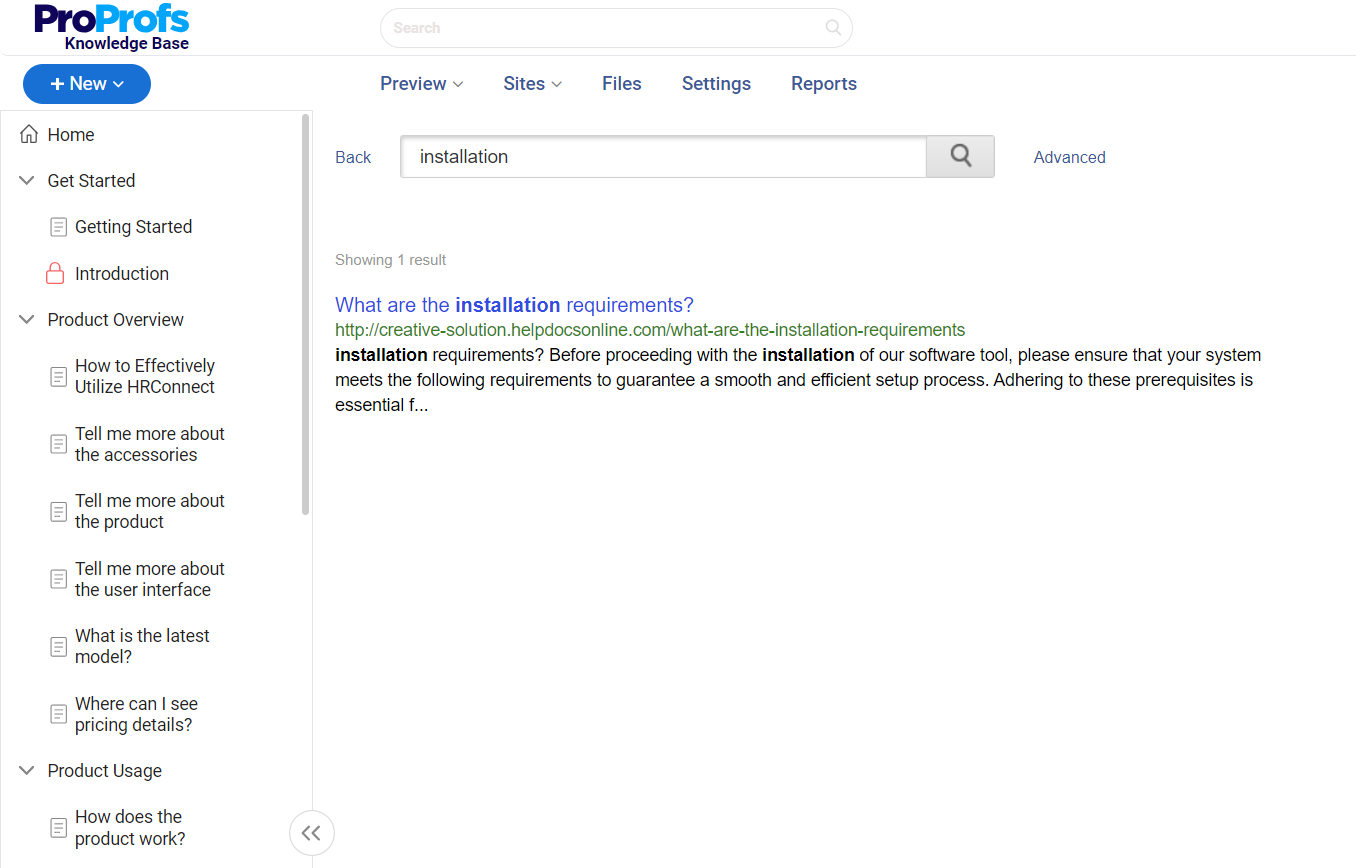
Unlike conventional search engines that rely on keyword matching, AI knowledge bases use semantic search technology.
Semantic search understands the context and relationships between words in a query, enabling more nuanced and accurate information retrieval. Even if a user mistypes a question, it can still retrieve the most relevant content based on the query’s underlying meaning.
User Context Integration
AI knowledge bases usually incorporate user context into their operations, including the user’s previous interactions, location, preferences, or any other relevant data.
This context enables tailored responses to the user’s specific situation, enhancing the personalization of support.
Predictive Assistance
By analyzing patterns in data and user behavior, AI knowledge bases support predictive assistance, proactively providing information that the user is likely to need next.
For example, if a user searches for information about installing software, the knowledge base might also suggest related topics like activation procedures or troubleshooting common installation issues.
Feedback Loop
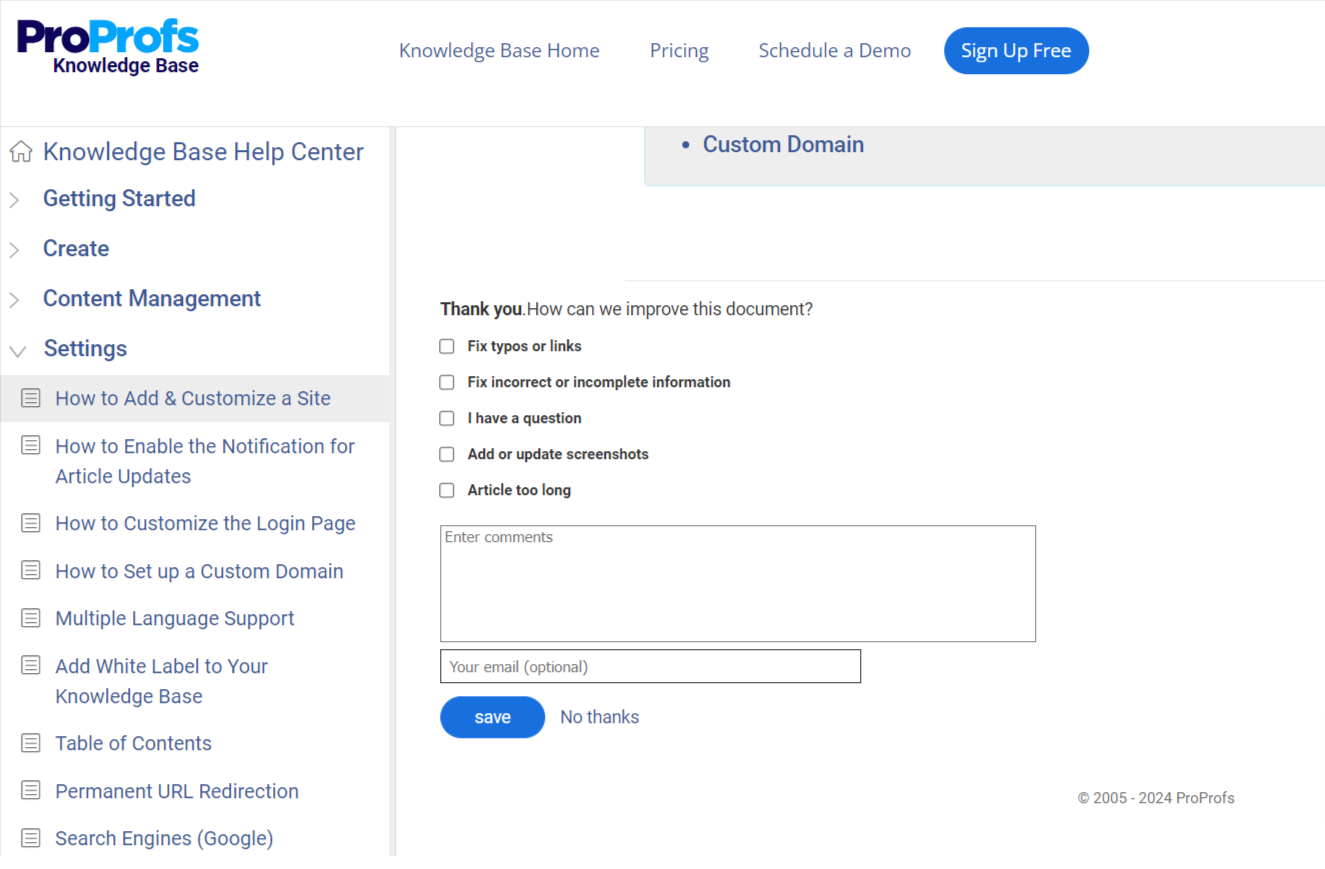
This lets users provide immediate feedback on the usefulness of the information provided. This feedback is crucial for training the AI, helping it learn which answers are most helpful, and refining less valuable responses.
What Are the Benefits of an AI-Powered Knowledge Base?
An AI knowledge base helps enhance how organizations interact with customers and employees.
Let’s discuss its most significant advantages:
Better Accuracy & Relevance of Information
AI knowledge bases provide highly accurate and relevant information in response to user queries. Through natural language processing, AI knowledge bases can understand the context and intent behind questions and pull precise content that directly addresses user needs.
This level of accuracy improves user satisfaction and reduces the time spent searching for the correct answers.
Improved User Experience
AI knowledge bases improve the user experience by enabling instant, on-demand access to information anytime and anywhere. This is particularly beneficial in customer service settings, where quick and effective responses are essential.
The AI’s ability to interpret and respond to natural language queries helps users interact with the knowledge base as if conversing with a human, making the process more intuitive and user-friendly.
Enhanced Efficiency
By automating information retrieval, AI knowledge bases reduce the time and effort human agents require to answer routine or repetitive questions.
This enables customer service teams to focus on more complex issues that require human intervention, optimizing resource allocation and boosting overall productivity.
Higher Scalability
AI knowledge bases are highly scalable and capable of handling multiple queries without the need for proportional increases in human resources.
As businesses grow and user interactions increase, AI knowledge bases can easily accommodate this growth, providing consistent and reliable service without compromising quality.
Continuous Learning & Improvement
AI knowledge bases can learn and improve over time. Machine learning algorithms analyze every interaction and feedback to improve the responses and the system’s accuracy.
This continuous learning process ensures that the knowledge base evolves in response to new information, user behaviors, and feedback, thus staying current and increasingly effective.
What Are the Different Types of AI-Powered Knowledge Base Content?
AI-powered knowledge bases can incorporate different types of content to effectively address different users’ needs.
Let’s discuss the three primary types of content usually found in AI-driven knowledge bases:
1. Factual Content
It includes simple, informative articles that provide direct answers to specific questions. It is essential for content resources like frequently asked questions (FAQs), product specifications, user manuals, and standard operating procedures (SOPs).
It is usually structured in a clear and concise manner to deliver quick and accurate information about features, processes, or policies.
AI enhances this content by structuring and tagging it to optimize retrieval, ensuring that users receive the most relevant answers based on their queries.
2. Tutorial Content
It aims to guide users through complex processes or teach them how to effectively use a product or service.
It usually includes step-by-step instructions, how-to guides, and instructional videos. AI enhances tutorial content by personalizing the learning experience based on the user’s previous interactions, preferences, or skill levels.
For example, an AI knowledge base could suggest specific tutorial content that builds on a user’s existing knowledge or previous queries, enabling a tailored educational journey.
3. Problem-Solving Content
It addresses more complex queries and issues that users may encounter. It typically includes troubleshooting guides, problem-resolution articles, and advanced technical support documentation. AI helps analyze the context of the user’s problem and provides dynamic solutions.
For example, if a user reports a specific error code, the AI knowledge base can instantly pull up a detailed troubleshooting guide specifically for that error, including potential causes and step-by-step remediation actions.
FREE. All Features. FOREVER!
Try our Forever FREE account with all premium features!
How to Create an AI Knowledge Base
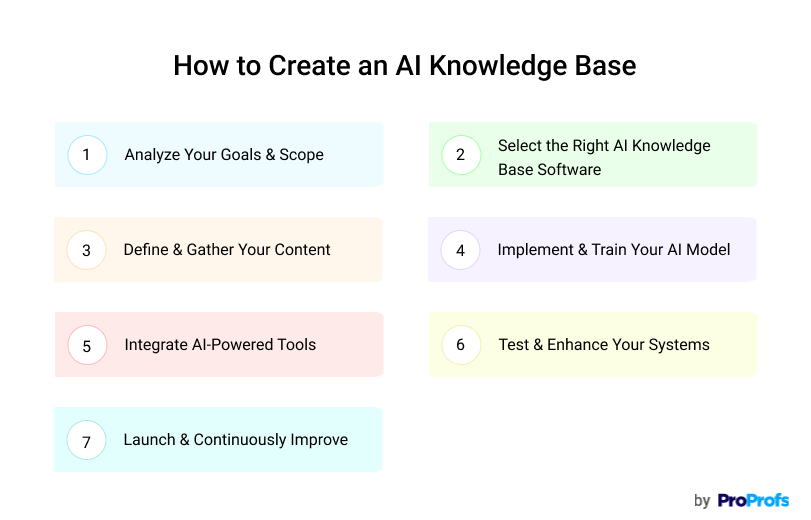
Building an AI knowledge base requires a strategic approach that blends technology with quality content to ensure that information retrieval is intelligent and user-centric.
Let’s discuss the key steps to effectively building an AI-powered knowledge base:
1. Analyze Your Goals & Scope
Before taking the first practical step, define your aim with your AI knowledge base. Define the scope by identifying the specific problems it needs to solve and the type of users it will serve.
Setting clear objectives will guide all the succeeding development steps, whether enhancing customer support, empowering employee training, or providing dynamic content access.
2. Select the Right AI Knowledge Base Software
Choose a robust AI knowledge base platform that suits your organization’s needs.
Prioritize features like AI-powered WYSIWYG editor, natural language processing, machine learning capabilities, and user-friendly content management systems. The platform should support easy integration with your existing tools and databases.
3. Define & Gather Your Content
Compile and organize the content that will populate your knowledge base. This includes documenting internal processes, FAQs, product information, and other relevant data.
Structure this content in a way that’s easy to navigate and understand, ensuring it’s comprehensive and covers all potential user queries.
4. Implement & Train Your AI Model
Integrate AI technologies like machine learning algorithms and natural language processing systems.
Train your AI model using the gathered content and additional training data to recognize patterns, understand user queries, and deliver accurate responses.
The training process involves feeding the AI large volumes of relevant data to ensure it learns effectively.
5. Integrate AI-Powered Tools
Improve your knowledge base with AI-powered tools like chatbots or virtual assistants. These tools use your knowledge base’s AI capabilities to interact directly with users, providing them with real-time answers and support.
Ensure these integrations are seamless and maintain the user-friendly aspect of your knowledge base.
6. Test & Enhance Your Systems
Meticulously test your AI knowledge base to identify any issues with understanding user queries or retrieving information. Initial testing should be thorough and involve real-world scenarios to ensure the AI accurately interprets and responds to user needs.
Based on feedback and performance, refine the AI algorithms and update your content to improve accuracy and efficiency.
7. Launch & Continuously Improve
Launch your AI knowledge base to your users once testing is complete, and the system is refined. Monitor its performance continuously, using user feedback and behavior to enhance the system further.
Regular updates and retraining of the AI model are crucial to adapting to new information, changes in user behavior, and advancements in AI technology.
Which Are the Top AI Knowledge Base Software & Tools?
Creating a sophisticated AI knowledge base requires robust tools for complex data processing and user interactions.
Let’s explore the top three knowledge base AI tools out there.
1. ProProfs Knowledge Base – Best for Easily Creating Help Sites, Manuals & Private Knowledge Bases
ProProfs Knowledge Base is an easy-to-use AI knowledge base platform with an AI text editor and built-in prompts. It helps businesses create a rich and interactive knowledge base.
This platform simplifies the creation and management of help documentation, FAQs, and manuals through a user-friendly interface and robust customization options.
It supports real-time collaboration and provides analytics to track user engagement and content effectiveness. Its AI capabilities ensure that the content delivery is tailored to user behavior and preferences.
What you will like:
- Flexible customization options allow businesses to tailor the knowledge base to their branding
- Multiple pre-approved knowledge base templates to choose from
- Seamless integration with other tools like CRM systems and chat software
- Strong customer support with numerous learning resources and responsive help
- Comes with a simple, forever-free pricing plan with all the premium features.
What you may not like:
- The forever free plan is limited to 25 articles
- Lacks an on-premise version.
Pricing:
Forever Free plan for up to 25 articles with all premium features. Paid plan starts at $49/author/month.
2. Korra – Best for Content Analysis
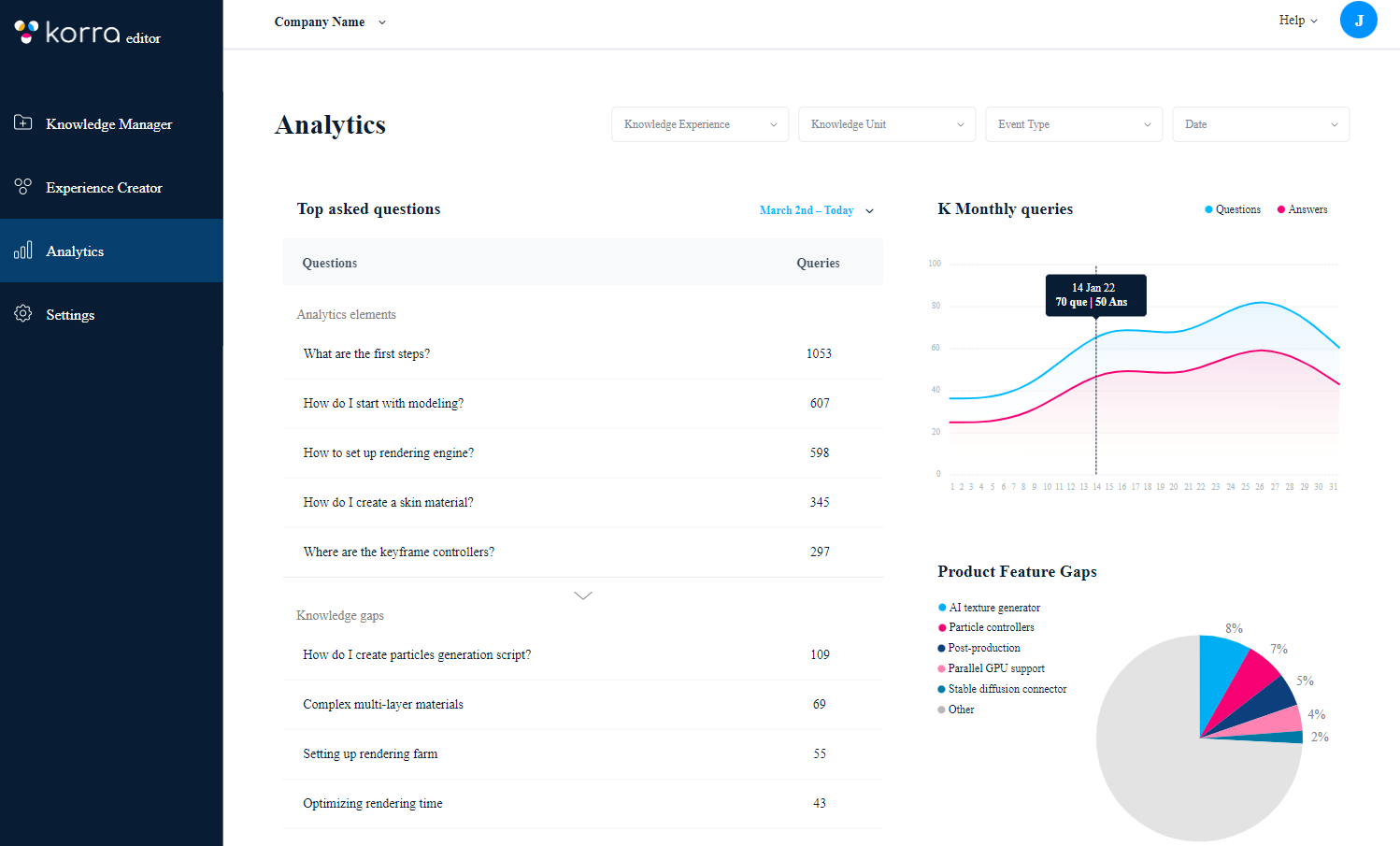
Korra specializes in automating customer support through its AI-powered knowledge base. The platform uses machine learning to understand customer queries and provide precise, contextually relevant answers.
It uses NLP to analyze content deeply, helping improve search accuracy and identify content gaps. It also offers deep learning capabilities that continually improve the quality and accuracy of responses based on user interactions.
Pros:
- AI-driven suggestions improve over time, learning from each interaction
- Easy integration with existing customer support platforms
- Provides detailed analytics on user interactions and satisfaction.
Cons:
- Higher learning curve due to advanced AI features
- Dependency on quality data input for optimal AI training.
Pricing:
A free plan is available. Paid plan starts at $99/month.
3. Starmind – Best for Internal Knowledge Sharing & Collaboration
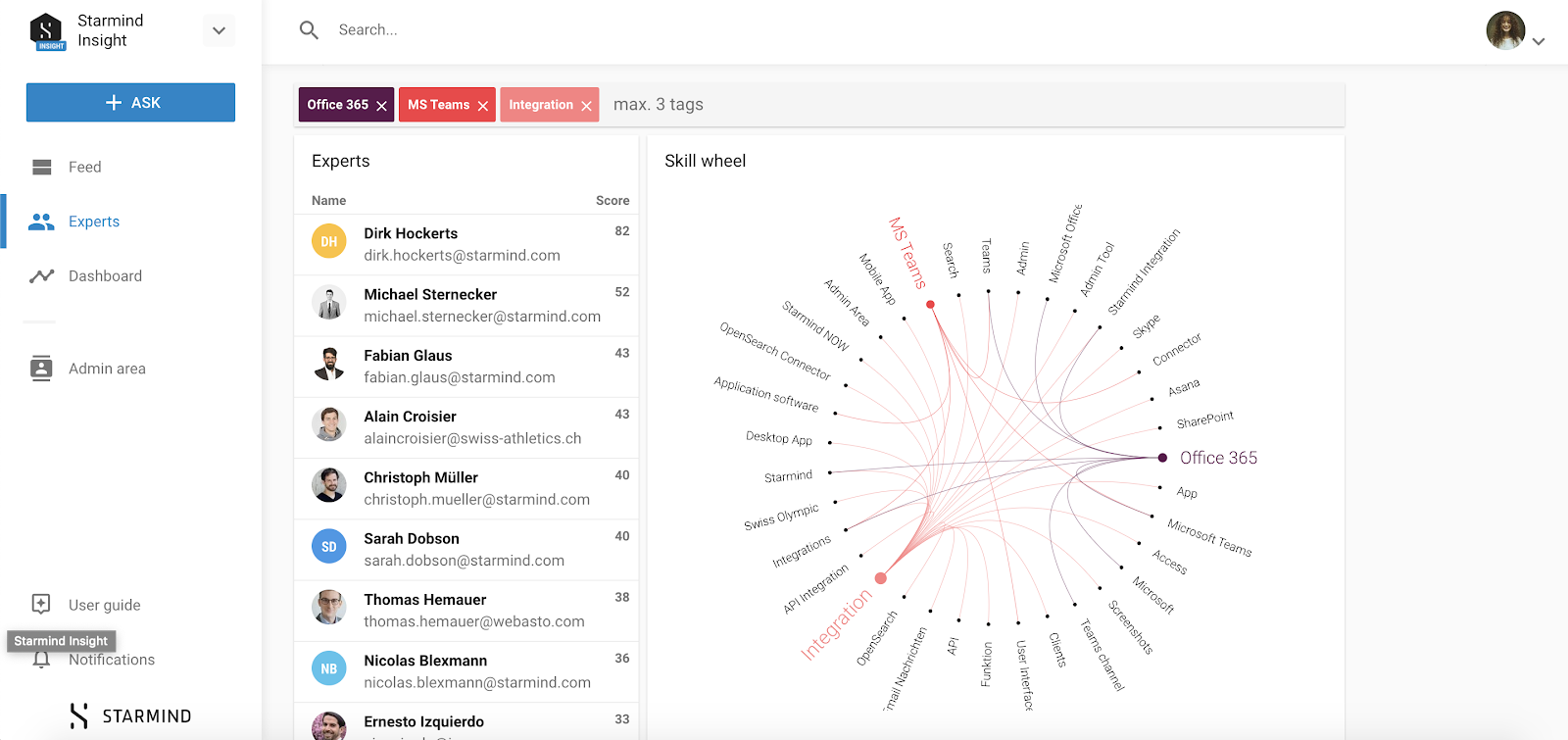
Starmind uses patented AI algorithms to develop a knowledge base that learns and grows within an organization. It unlocks employee knowledge, which is particularly useful for companies seeking to capture and disseminate internal expertise.
The platform’s AI analyzes users’ skills and expertise to route questions to the most qualified individuals, enhancing collaborative problem-solving.
Pros:
- Harnesses employee expertise effectively
- Scalable and adapts to organizational changes
- Offers robust data security measures.
Cons:
- Focuses more on internal knowledge and less on customer-facing features
- Requires active employee participation to be effective.
Pricing:
Paid plan starts at $6/month/user for a minimum of 500 users.
Optimize User Experience & Learning With AI Knowledge Base
AI knowledge bases streamline access to information and enhance user engagement through personalized experiences. They also continuously improve over time, adapting to user behaviors and evolving needs.
Whether you’re looking to enhance customer support, empower your employees, or optimize your information management, an AI knowledge base can transform your approach to knowledge dissemination.
ProProfs Knowledge Base offers a robust platform that integrates AI functionalities to help automate and refine knowledge content management. It features an AI-powered WYSIWYG editor for error-free, collaborative content creation and intelligent search for anticipating user queries, providing instant, accurate answers.
Explore how ProProfs Knowledge Base can streamline your knowledge management efforts and create a more informed and efficient environment.
FAQs – Know More About AI Knowledge Bases
Q. How can a generative AI knowledge base improve knowledge management?
A generative AI knowledge base can improve knowledge management by dynamically creating content that answers user queries, learning from interactions to improve its responses over time.
It reduces the need for manual updates and entries by automatically generating accurate and contextually appropriate solutions, thereby streamlining the information retrieval and distribution process.
Q. How should knowledge management teams implement generative AI?
They should start by defining clear objectives and scope for integrating generative AI into their systems.
The next step would be to select AI technologies that align with their specific needs, ensuring these tools seamlessly integrate with existing databases and platforms.
Training the AI with diverse, accurate datasets is also crucial to its effectiveness, as is establishing a continuous feedback loop to refine AI behavior.
Q. What is an example of an AI-based knowledge base?
An example of an AI-based knowledge base is a customer support system for a telecom company that uses AI to automatically generate troubleshooting guides and FAQs based on typical customer issues reported via call logs, chat transcripts, and service tickets.
The system continuously learns from customer interactions and updates its content to reflect the most current and practical solutions, ensuring customers receive accurate support for their queries without human intervention.
 Tips
Tips
We’d love to hear your tips & suggestions on this article!
FREE. All Features. FOREVER!
Try our Forever FREE account with all premium features!

 We'd love your feedback!
We'd love your feedback! Thanks for your feedback!
Thanks for your feedback!




